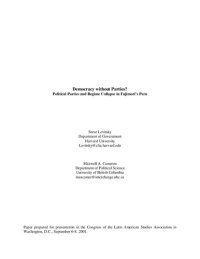
Ebook: Democracy without Parties? Political Parties and Regime Collapse in Fujimori’s Peru
Author: Steve Levitsky, Maxwell Cameron
- Genre: Other Social Sciences // Politics
- Tags: Peru, Politics, Política peruana, Elecciones en el Perú, Peruvian Politics
- Series: Latin American Studies Association LASA 2001
- Year: 2001
- City: Washington, DC
- Language: English
- pdf
This paper analyzes the relationship between party collapse and political regimes in Peru.
After an initial discussion of why parties continue to matter in a democracy, the paper examines
three central questions. First, it seeks to explain the decomposition of the Peruvian party system.
We argue that although the profound structural crisis of the 1980s created an opening for the
election of an anti-political establishment candidate, the actual collapse of the party system, and
its replacement with an atomized, candidate-centered system, were largely the product of Alberto
Fujimori’s political success in the wake of the 1992 autogolpe.
5
Non-Fujimorista politicians
drew two lessons from this success: (1) that public opinion would not reward the defense of
formal democratic institutions and (2) that parties were not necessary for— and may even
impede— career advancement. In light of these lessons, scores of politicians abandoned both
established parties and the democratic opposition, becoming political “independents” who
pursued short-term, individualistic electoral strategies.
After an initial discussion of why parties continue to matter in a democracy, the paper examines
three central questions. First, it seeks to explain the decomposition of the Peruvian party system.
We argue that although the profound structural crisis of the 1980s created an opening for the
election of an anti-political establishment candidate, the actual collapse of the party system, and
its replacement with an atomized, candidate-centered system, were largely the product of Alberto
Fujimori’s political success in the wake of the 1992 autogolpe.
5
Non-Fujimorista politicians
drew two lessons from this success: (1) that public opinion would not reward the defense of
formal democratic institutions and (2) that parties were not necessary for— and may even
impede— career advancement. In light of these lessons, scores of politicians abandoned both
established parties and the democratic opposition, becoming political “independents” who
pursued short-term, individualistic electoral strategies.
Download the book Democracy without Parties? Political Parties and Regime Collapse in Fujimori’s Peru for free or read online
Continue reading on any device:

Last viewed books
Related books
{related-news}
Comments (0)